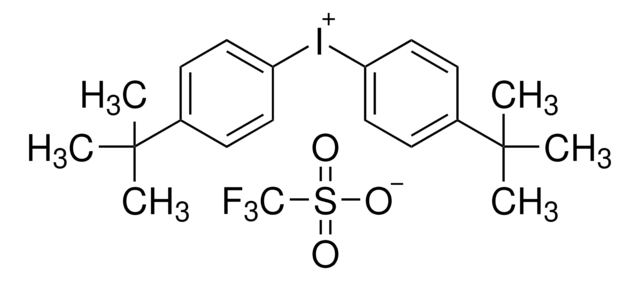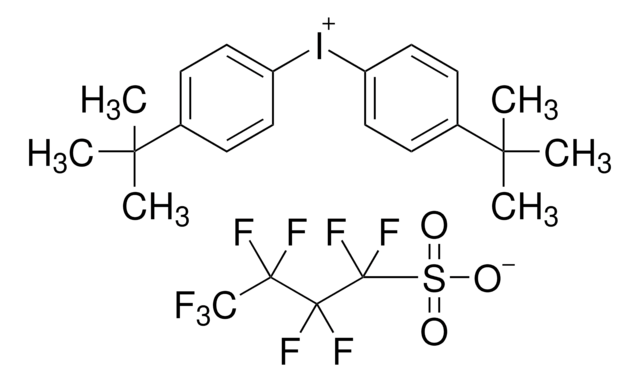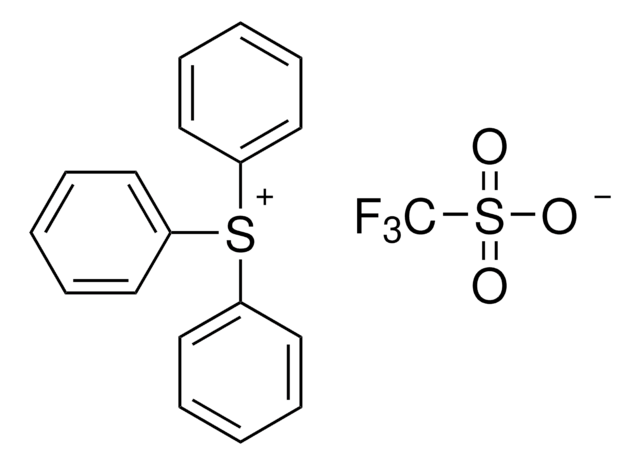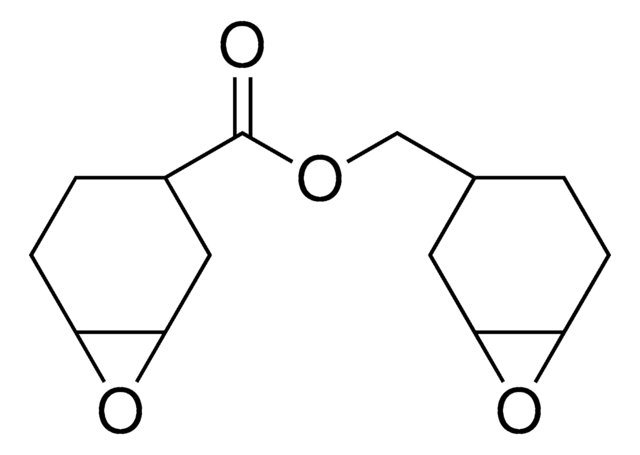726206
Bis(4-tert-butylphenyl)iodonium hexafluorophosphate
98%
Sign Into View Organizational & Contract Pricing
All Photos(1)
About This Item
Empirical Formula (Hill Notation):
C20H26F6IP
CAS Number:
Molecular Weight:
538.29
Beilstein:
5721061
MDL number:
UNSPSC Code:
12352300
PubChem Substance ID:
NACRES:
NA.23
Recommended Products
Quality Level
Assay
≥97.5% (TLC)
98%
form
solid
SMILES string
F[P-](F)(F)(F)(F)F.CC(C)(C)c1ccc([I+]c2ccc(cc2)C(C)(C)C)cc1
InChI
1S/C20H26I.F6P/c1-19(2,3)15-7-11-17(12-8-15)21-18-13-9-16(10-14-18)20(4,5)6;1-7(2,3,4,5)6/h7-14H,1-6H3;/q+1;-1
InChI key
CJLLNCQWBHTSCB-UHFFFAOYSA-N
Signal Word
Danger
Hazard Statements
Precautionary Statements
Hazard Classifications
Skin Corr. 1B
Storage Class Code
8A - Combustible corrosive hazardous materials
WGK
WGK 3
Flash Point(F)
Not applicable
Flash Point(C)
Not applicable
Choose from one of the most recent versions:
Already Own This Product?
Find documentation for the products that you have recently purchased in the Document Library.
Customers Also Viewed
Man-Yu Duan et al.
Physical chemistry chemical physics : PCCP, 19(3), 2353-2358 (2017-01-06)
In this study, we demonstrate a novel method for fabricating polymer stabilized cholesteric liquid crystal (PSCLC) films with non-uniform pitch distribution by utilizing two kinds of photo-induced processes. Based on the large HTP temperature dependence of a chiral dopant, polymer
Haifaa Mokbel et al.
Macromolecular rapid communications, 41(15), e2000289-e2000289 (2020-07-09)
Free radical polymerization upon near-infrared (NIR) light is still the subject of intense research efforts and remains a huge challenge particularly for long wavelengths (>1000 nm). In this study, a NIR sensitizer operating upon long wavelength (1064 nm) is proposed for an
Alvaro Iregui et al.
Polymers, 11(3) (2019-04-10)
In this work Poly ε-caprolactone (PCL)/ Diglycidyl ether of bisphenol A (DGEBA) blends were electrospun and the obtained mats were UV cured to achieve shape memory properties. In the majority of studies, when blends with different compositions are electrospun, the
Shaohui Liu et al.
Polymers, 12(6) (2020-06-26)
In this article, different substituents (benzoyl, acetyl, styryl) are introduced onto the carbazole scaffold to obtain 8 novel carbazole derivatives. Interestingly, a benzoyl substituent, connected to a carbazole group, could form a benzophenone moiety, which composes a monocomponent Type II
Shaohui Liu et al.
Macromolecular rapid communications, 41(23), e2000460-e2000460 (2020-09-23)
In this study, a new generation of photoinitiator (PI) based on hybrid structures combining benzophenone and triphenylamine is proposed. Remarkably, these photoinitiators (noted monofunctional benzophenone-triphenylamine (MBP-TPA) and trifunctional benzophenone-triphenylamine (TBP-TPA)) are designed and developed for the photopolymerization under light-emitting diodes
Our team of scientists has experience in all areas of research including Life Science, Material Science, Chemical Synthesis, Chromatography, Analytical and many others.
Contact Technical Service











